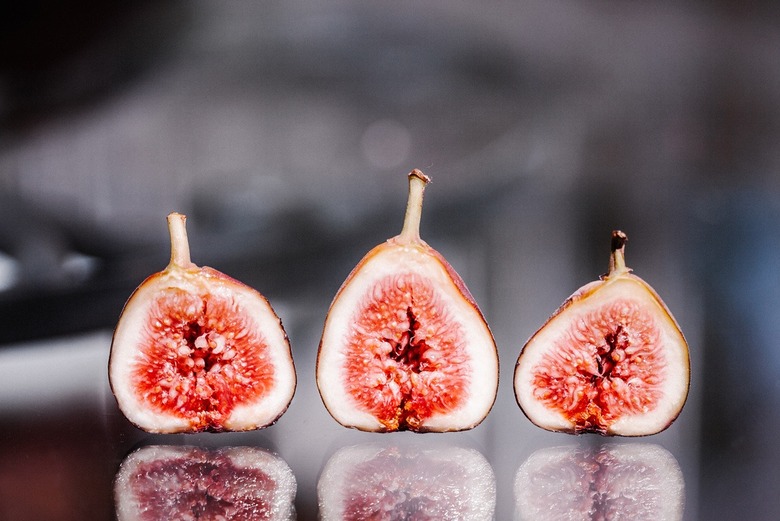Surprising Sources Of Fiber To Add To Your Diet
You might think that slice of bread on your plate is necessary to get the fiber you need to be healthy. Think again. Bread isn't all it's cracked up to be, and there are plenty of foods that can give you all the fiber you need on a daily basis. These fiber-filled all-stars have far more fiber and nutrition per calorie than wheat, and lots of other health benefits, too. Combine as many as you can in one dish, like black beans with oregano, mustard greens, avocados, and barley, for one of the healthiest meals of your life.
Figs
Figs are a deliciously high-fiber fruit, containing 6.58 grams in an eight-ounce serving. You can get dried figs year-round, but there's nothing quite like a juicy, fresh fig. These fruits are a great source of calcium and are also high in potassium and manganese. According to a 2008 study, there's another compelling reason to consume figs as often as possible: Fiber from fruits may help prevent post-menopausal breast cancer.
Avocados
Rich and creamy, avocados can seem like a splurge. While they are dense in fat and calories, spreading a little bit on your tortilla or chopping it up for salad not only adds a lot of flavor to your meal, it also boosts your fiber intake. At 14 grams apiece, avocados contain more fiber per ounce than any other fruit. Of a single avocado's 24 grams of fat, only 4 are saturated, so they help lower "bad" LDL cholesterol and raise "good" HDL levels. They're also rich in lycopene, beta carotene, lutein, magnesium, and the vitamins B, E, and K.
Beans
Beans pack the biggest fiber punch of any food, with navy beans topping the charts at more than 76 percent of your daily value per one-cup serving. Dried peas, lentils, pinto beans, black beans, and lima beans are also fiber all-stars, providing more than half of your daily value. Most types of beans are high in protein, folate, iron, and B-vitamins, and very low in fat. Legume consumption has been associated with increased heart health.
Barley
This grain doesn't get a lot of love. Always in the shadow of its more famous counterparts wheat, oats, and rye, barley is used more often as animal fodder or to make beer than it is in our daily diets. But barley is appealingly chewy and sweet, and when it comes to fiber, it's right up there with beans. A cup will provide more than 54 percent of your daily fiber requirements. The fiber in barley is insoluble, so it provides bulk as it passes through your body, improving the health of your intestines and lowering cholesterol. It's a great source of selenium, which lowers risk of colon cancer and helps metabolize thyroid hormones.
Eggplant
This deep purple-skinned vegetable is often cooked down to such a mushy state, it's hard to believe there's much fiber in it. But in fact, eggplant has nearly 3 grams of fiber for every 19.7 calories. This means that unlike bread, which is high in calories for just a few grams of fiber, eggplant is an ultra-efficient means of reaching your daily requirements. Nutritionally dense, eggplant will provide you with lots of manganese, potassium, folate, B6, K, and C per serving.
Click here for more Surprising Sources of Fiber.
— Stephanie Rogers, EcoSalon
More From EcoSalon:
